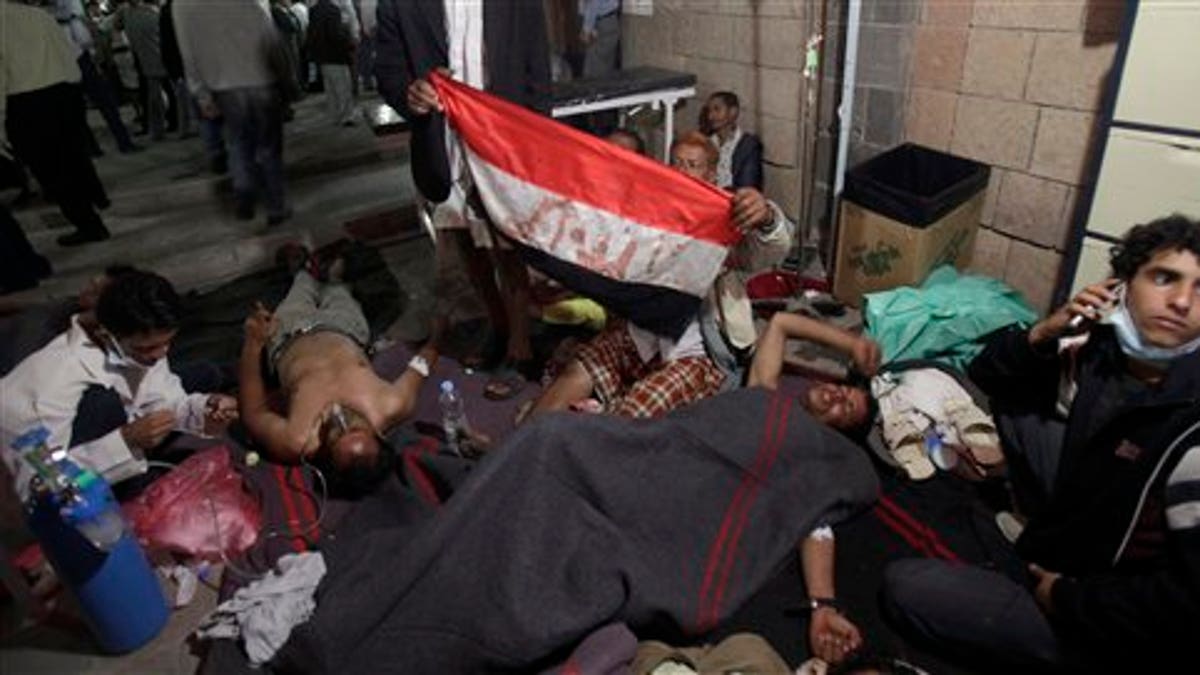
April 27: Wounded anti-government protestors lie on the ground of a field hospital following clashes with Yemeni security forces in Sanaa, Yemen. (AP)
SANAA, Yemen -- Yemeni security forces opened fire on a massive anti-government demonstration in the capital Sanaa on Wednesday, killing 12 protesters and wounding some 190, a doctor at the scene said.
The violence broke out as about 100,000 government opponents filled a landmark square at the epicenter of the uprising, spilling into the streets around the state TV building. Witnesses said security forces, including members of the elite Republican Guard, fired live ammunition and tear gas into the crowd to break it up. Snipers were seen on nearby rooftops aiming at the crowd.
"Many of the dead and wounded were shot in the head and torso," doctor Mohammed al-Ibahi told The Associated Press.
Yemenis in at least 18 cities and towns launched a civil disobedience campaign Wednesday in an escalation of their more than two-month-old uprising to bring down long-serving President Ali Abdullah Saleh. Shops, schools and government offices were shuttered. The closures are planned twice weekly until Saleh steps down, activists said.
Inspired by revolts across the Arab world, Yemenis have staged near-daily protests calling for the ouster of Saleh, the country's ruler of 32 years. At times, millions have flooded the streets of the capital and other cities and towns. The president has clung to power despite the street protests and defections by many loyalists, including his tribesmen, military officers and senior officials.
Security forces and Saleh supporters have killed more than 130 people since the unrest erupted in early February.
Chaos ensued after government forces opened fire in Sanaa Wednesday, sending protesters scattering in all directions to escape sniper fire and security agents hurling rocks.
Activists said many of the security forces shooting into the crowd were dressed in civilian clothing. "We were massing peacefully along the state television building and suddenly I heard so much gun fire whizzing by," said demonstrator Nashwan al-Badani. "People began to panic and fall to the ground as they stampeded to escape the shooting."
Ambulances rushed the wounded to the hospital, where the screams of women who had lost their children in the panic rang through the halls.
Ahmed al-Maqtari, a doctor helping to treat the wounded, said the injuries included wounds from live ammunition, rocks, and tasers.
Yemen was already a country teetering on the brink even before the uprising began. Poverty and corruption are rampant, and there is widespread lawlessness. The weak central government, backed by the U.S., was grappling with one of the most active Al Qaeda offshoots in the world, as well as a southern secessionist uprising and a Shiite rebellion in the north.
In other violence Wednesday, units of the elite Republican Guard force in the southern port city of Aden clashed with anti-government demonstrators who were marking the anniversary of the 1994 outbreak of Yemen's civil war that saw Saleh's army suppress an attempt by the southerners to secede.
One protester was killed and dozens were wounded in the clashes that involved tanks, armored cars and heavy weapons, according to local activist Wajdi al-Shaabi.
And in the country's second largest city, Taiz, tens of thousands demonstrated in main streets against a Gulf Arab initiative which has proposed giving Saleh and his family immunity from prosecution if the president steps down within 30 days, activist Nouh al-Wafi said.
Elsewhere, two soldiers were killed and three wounded when masked gunmen attacked a military checkpoint at the entrance of Zinjibar, the capital of southern Abyan province that has been a hotbed for Islamic militants.
Col. Ahmed al-Muhsini of Zinjibar intelligence office confirmed the attack over the telephone and told the AP that the assailants fled afterward.
The authors of the Gulf Arab initiative, the six-nation Gulf Cooperation Council, will meet Sunday in the Saudi capital Riyadh where its foreign ministers are to fine-tune the draft proposal for ending Yemen's crisis.
Yemen's opposition parties said Tuesday they will soon sign the deal, which Saleh has already agreed to. It calls for the creation of national unity government and would have Saleh transfer power to his vice president within 30 days of the signing of the deal. In exchange, Saleh and his family would received immunity from prosecution.
But the proposal appears to have opened a serious rift between opposition parties and the hundreds of thousands of protesters on the streets, who are suspicious and instead demand Saleh resign immediately.
The head of the Yemeni opposition's council for dialogue, Salem Mohammed Bassindwa, said GCC chief Abdullatif bin Rashid al-Zayani would visit Sanaa on Saturday, ahead of the meeting in Riyadh.
Saudi reports have speculated that the deal on ending Yemen's crisis could be signed as early as Monday in Riyadh.
In a sign of the opposition's suspicions, Bassindwa said his side would only accept a deal that Saleh signed personally and not one signed by a presidential envoy. He suggested it would be best for Saleh to sign the agreement in Sanaa, with witnesses from the GCC, United States and the European Union.
"What happened today is nothing short of a crime," said protester Khaled al-Insi. "Saleh must not only go as leader, but he must also be tried in a criminal court."
